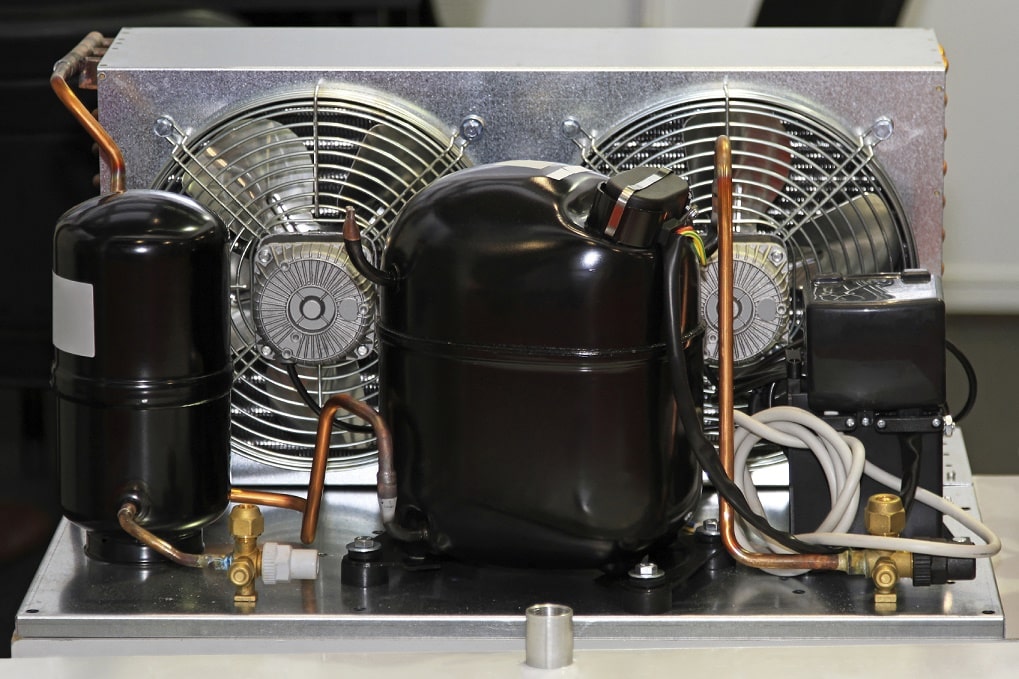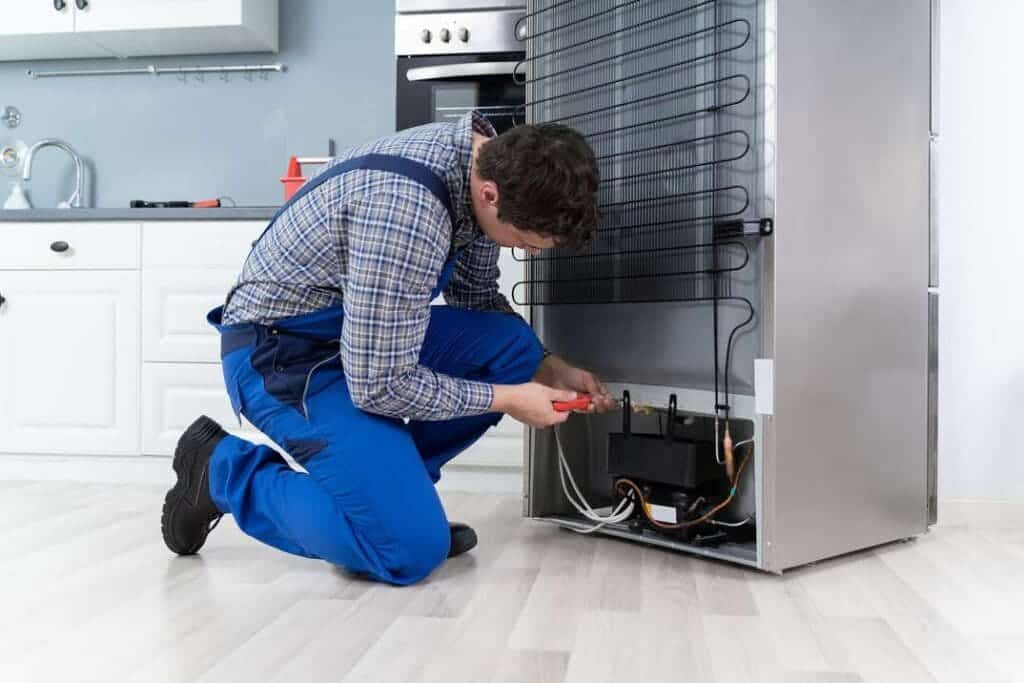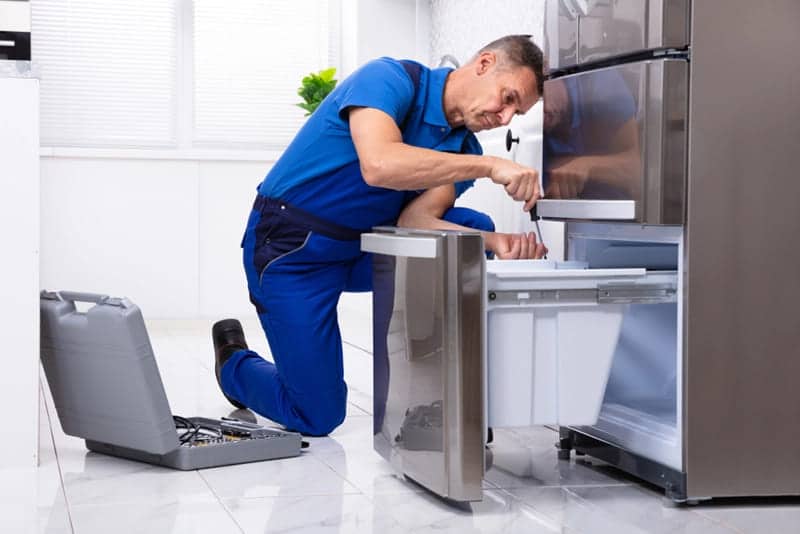Table of Contents
Refrigerators are essential for contemporary households as they add convenience to our lives by keeping our food fresh and drinks cold. However, sometimes, the peaceful atmosphere of the house can be disrupted by an unwanted humming noise produced by this useful machine. Humming noises can be caused by dysfunction of its components, including the ice maker, water supply, condenser fan, and evaporator fans. These noises range from a calm, inoffensive humming to a loud, annoying buzzing from a refrigerator. To ensure the peace of your house, it is necessary to know what is causing the refrigerator to produce these irritating noises while taking steps to fix it.
In this guide, we will examine common causes of refrigerator noise, how to reduce these disruptions, and preventive measures to ensure your refrigerator functions smoothly and silently. By addressing problems like excess humidity, a broken fan motor, and problems with the refrigerator door, you can significantly minimize the humming noise and bring peace back to your living area.
Identifying the Reasons for Humming Sounds

A refrigerator’s buzzing sound may come from one or more internal parts. Although these noises are characteristic of regular operation, unless the refrigerator starts to hum more loudly than it usually does, there might be a problem. Below are some common causes of loud refrigerator humming.
1. Evaporator Fan
The evaporator fans blow air over the coils to retain the coldness of your refrigerator and freezer sections. The evaporator fan can produce a loud humming noise if it gets blocked or if the fan motor malfunctions. Humming sounds can also result from dirt or ice building up on fan blades over time.
2. Condenser Fan
The condenser fan at the bottom or back of the refrigerator helps cool the compressor and condenser coils. A damaged or blocked fan hinders the refrigerator’s smooth workings, resulting in a loud humming sound. Regular cleaning can prevent such an issue.
One of the main reasons refrigerators have problems is the buildup of condenser coils. Knowing how to clean condenser coils will help your fridge run smoothly for years. This simple maintenance task should be part of your regular cleaning and will save you money on repairs in the future.
3. Ice Maker and Water Supply
Refrigerator noise can originate from a refrigerator connected to a water supply for its ice maker. Problems like a broken ice maker or a connected water line can cause a buzzing sound. These sounds can be reduced by ensuring the ice machine operates effectively, and the water line is clear.
4. Excessive Moisture
Humming noises may become stronger in a humid refrigerator. Due to high humidity, ice buildup on the evaporator fan blades may cause the unit to function louder. Regulating the humidity levels can maintain a quiet humming.
5. Drain Pan
Condensation is collected in the drain pan, which is found at the bottom of the refrigerator. If the drain pan loosens or breaks, it may vibrate and make a humming sound. Checking and fastening the drain pan can reduce these sounds.
Ways to Reduce Refrigerator Humming

1. Turn Off the Power
To protect safety, always turn off the refrigerator’s power before performing maintenance. This will stop the buzzing sounds and make it easier for you to locate the source of the noise.
2. Inspect the refrigerator door
Check the quality of the refrigerator door seals. The refrigerator must work hard to maintain the ideal temperature when the door opens frequently or does not seal properly, which causes a loud buzzing sound. Door seal replacement or repair can be helpful.
3. Examine the condenser and evaporator fans
Check and clean the condenser and evaporator fans regularly. Ensure the fan motor is operating correctly, and clean the fan blades of dirt or ice. If the evaporator or condenser fan is damaged, consider changing or repairing it.
4. Maintain the Ice Maker and Water Supply
Look for blockages or leaks in the water supply line leading to the ice maker. Ensure the ice maker is running effectively and not making too much noise. Refrigerator humming noise can be significantly reduced by replacing or repairing damaged parts.
5.Maintain the Humidity Levels
Maintain low humidity levels in the kitchen by using a dehumidifier or ensuring sufficient air circulation. This can lessen your refrigerator’s humming noises and prevent ice from accumulating on the evaporator fan.
6. Secure the Drain Pan
Check that the drain pan is in the right place and is not broken. An intact and unbroken drain pan can reduce the buzzing sound that results from vibrations.
Unattended refrigerator leaks can cause mold growth and water damage, which can be quite unpleasant. The drip pan is one important part of your refrigerator that may leak. In this guide, we’ll look at how to clean the drip pan to stop leaks quickly.
Resolving Common Humming Problems

Issues with the Evaporator Fan
If the refrigerator’s evaporator fan makes a humming noise, consider defrosting the freezer to remove any ice buildup. If the noise persists, replacing the fan motor may be essential to get rid of the refrigerator humming.
Condenser Fan Issues
If the condenser fan causes the refrigerator to hum, clean the fan and its surroundings. If the fan motor is broken, replacing it will fix the problem.
Issues with Ice Makers and Water Supply
Check to ensure the water supply line is not damaged or blocked in freezers with built-in ice makers. Regular service can avoid loud buzzing noises in the ice maker leading to refrigerator humming.
Door Seal and Alignment
If the refrigerator’s door isn’t closing completely, it may hum while trying to maintain temperature.
Resolve this issue by adjusting the door’s alignment and fixing or replacing its seals.
Preventive Measures for a Quieter Refrigerator

Regular Maintenance
All refrigerator parts should have routine maintenance performed, but the ice maker, condenser fan, and evaporator fan require special attention to prevent the refrigerator from humming.
Proper Placement
Ensure your refrigerator is on a level surface to prevent vibrations and noise.
Cleanliness
Keep the refrigerator and surroundings clean to prevent debris buildup that could result in humming noises.
Expert Assistance
If you are unable to locate or address the cause of the noise, get expert help. A technician can identify and resolve complex issues like fan motor difficulties or ice maker problems.
Conclusion
In conclusion, a humming refrigerator is more than just a tiny disturbance; it affects your house’s peaceful and comfortable atmosphere.
Therefore, resolve this issue quickly to keep your device functioning properly.
You may reduce or even eliminate the refrigerator humming noise by finding its root causes, including problems with the ice maker, condenser fan, or evaporator fan, and then finding practical solutions to fix the issues. Preventing these noises depends mostly on routine maintenance, such as clearing the water supply and cleaning the fan blades.
Furthermore, stopping the refrigerator from trying to work harder and checking humidity levels can help reduce the likelihood of a loud refrigerator humming. If these solutions are not effective, you may need to replace or repair faulty components. By giving your refrigerator the necessary maintenance, you can ensure it runs smoothly and silently and contributes to a more comfortable and peaceful living space.

